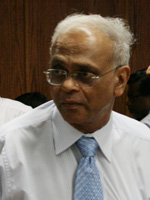 Does economics, which is generally believed to be as ‘hard to comprehend’ help to explain the mysteries of how people and society operate? Does economics, which is generally believed to be as ‘hard to comprehend’ help to explain the mysteries of how people and society operate?
According to W.A. Wijewardena, Deputy Governor Central Bank (CB), the rules of supply and demand aren't inherently more complex to grasp than those that apply to, say, politics, or cooking. In a new book, 'Economic Wisdom for Babies’ to be launched next month, he says, ‘As long as scarcity rules the world, an economic man should necessarily live in every human being.’
Columns pave way
"On an invitation by The Sunday Times FT to write complex economic issues the public face in a simple, reader-friendly manner, I started writing a column by the same name as the book,” he said. The first article was so well received by the public that he decided to continue with the series.
He says that the nearly 37-year tenure at CB and close to 20 years experience as a lecturer in economics taught him why lay persons are unable to comprehend 'economics'.
"With the interaction I had with students and the general public in my time at CB and also as a teacher, I realized that 'economics' need to be simplified. The articles for The Sunday Times FT were a natural progression to this realization." These articles – 34 in all together with four new ones are incorporated in the book by popular demand.
Mr. Wijewardena has spent the major part of his CB career in the Economic Research Department (from 1977 to 1993). "I have seen the transformation of Sri Lanka's economy from a closed to an open economic system. I have also witnessed the major problems the economy faced when the ethnic war broke out," he recalled the memories that are etched in his mind forever.
He also noted how the economy had to 'manage' during the 1987-89 insurgency era and how the economy was accelerated during the Premadasa regime.
'Full' career
Mr. Wijewardena will retire this June when he turns 60. "In hindsight, my time at the Economic Research Department was a 'full' career development," he said, adding that in early 1979 to 1982, there was a huge expansion in government expenditure and money supply while inflation hit 26%. "We introduced quantitative credit controls at the time and this was a critical issue as we had to fight inflation.
At the time I was a senior economist. By 1985, inflation was reduced to 1.5%, "he reminisced.
In his book it is explained that economics is about solving problems. He said that economics is more about finding the truth, even if the truth may go counter to what you, and most people, may intuitively believe.
Comprehending paradoxes

The author |
In simple parlance he explains that economics is about paradoxes - providing answers to riddles that are opposing to accepted opinion yet are true. In chapter four “The high inflation-high growth paradox” explains this thoroughly.
Daily battles countered by couples are addressed in ‘Marriage: Economic principles of work allocation’, while the argument on fuel price hikes are addressed in “Should the fuel prices be raised or not?”
Mr. Wijewardena in his tenure had seen how the International Monetary Fund (IMF) operated in the country. “I saw how it came and went and how monetary policy was tightened by using quantitative measures such as credit ceilings, graduated scales of leading by CB, introduction of credit plans and expanding CB's refinance credit schemes, etc."
He had also experienced changes in monetary policy from quantitative to market based, and how the country adapted the broad money supply from narrow money supply. “I witnessed Sri Lanka accepting article VIII of the IMF, where she pledged to the world that she will remove all controls on current account transactions, which saw the opening up of the current account."
Some of these experiences are incorporated in the book in some chapters – for instance in chapter five – “Protectionism : That’s the world but this’s Sri Lanka”.
He had been Director Rural Credit when the bomb blast happened in January 31, 1996. "My department was at the 8th flour of the Cargo Boat building facing Queen's Street.
The entire episode was like an enactment of a movie. Then a minor employee raised an alarm, where about 10 of us ran to the middle of the room and laid on the floor, when the ceiling fell on us. It was a narrow escape. Two days later we started work at the Centre for Banking Studies at Rajagiriya," he said.
While having worked at many departments at the CB, Mr. Wijewardene always had assignments such as being Director of Studies of Institute of Bankers from 1986 to 2003. “I was lecturing economics at University Sri Jayawardenapura from 1990 upto now."
Floating the rupee
Mr. Wijewardena remembered floating the rupee in 2001. "The foreign reserves were eroded. We had imports worth two to three weeks in January 2001. At the time we made a painful decision to float the currency. It was like a nightmare for all of us.
We had two comforts where the Swedish Central Bank gave us technical assistance which somewhat built confidence in us while the IMF also issued a strong statement saying that it is endorsing our decision. This was a tough testing of our ability to withstand the crisis," he explained.
So what next after retiring? "More writing and teaching, which I love the most," was the prompt reply. |

 Does economics, which is generally believed to be as ‘hard to comprehend’ help to explain the mysteries of how people and society operate?
Does economics, which is generally believed to be as ‘hard to comprehend’ help to explain the mysteries of how people and society operate? 